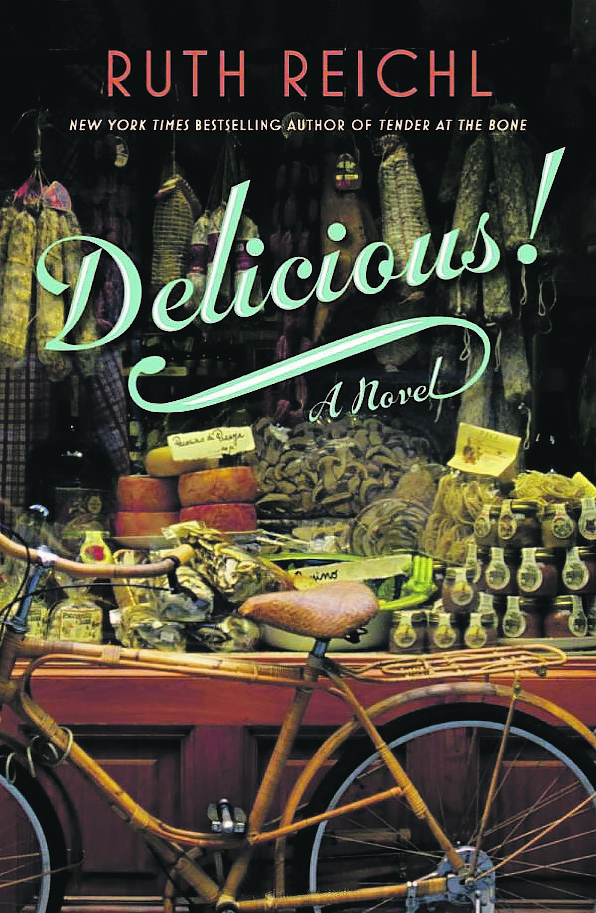“You should have used fresh ginger!” writes Ruth Reichl in kicking off her debut novel, “Delicious!”
As opening lines go, “Call me Ishmael” it ain’t. But if anyone is going to kick off a novel with a knob of ginger, who better than Reichl? After all, she has built her career around food, as a restaurant critic for the Times, both Los Angeles and New York; as the final editor-in-chief of the late and much lamented Gourmet magazine; and as a memoirist whose biographical works were as much about food as they were about herself.
This first novel, then, reveals Reichl is following the sage advice often given to writers: Work from what you know. While a plot thick with food and culinary references will attract many foodies who have made up her reader base in the past, it can lead one to wonder how much of this book is fiction, fact or something in between.
Reichl’s choice of central character blurs the line further. Billie Breslin may dress drab and have forgettable hair, a vivid contrast to Reichl’s famously luxuriant locks, but she is just as bright-eyed and whip-smart as her creator, with a flair for cooking and a love of writing. She goes to work at a beloved food magazine, the “Delicious!” of the title – only to see the magazine killed off.
Billie is kept on to handle reader complaints and stumbles across a mystery involving World War II-era letters from a young girl in Ohio to none other than the late, great James Beard, who is often called the dean of American cooking.
Unlike Reichl, to whom I warmed quickly through her reviews, books and the occasional telephone interview, I wasn’t wild about Billie – at least in the beginning. Indeed, there were times I wished it was she, not the magazine, who suffered an early demise. She just seemed so – so perfect, so talented, so sure – so the kind of food person I’ve always loved to hate.
Wait, maybe hate is too strong a word. Jealousy? Yes. Envy? Yes. But can you blame me? Just consider what Billie manages to do in 400 pages:
• Arrives in Manhattan and lands not one but two cool food-themed jobs, the second at a family-run Italian deli where she’s practically adopted as one of their own.
• Makes friends with and is taken seriously by magazine types so interesting and creative you have to wonder if they are based on real people Reichl has known. (Are you in there, Colman Andrews?)
• Effortlessly displays the reportorial skills of a Woodward or Bernstein in uncovering the mystery that lies at the center of “Delicious!”
• Chows down on food that seems to be mostly artisanal, locally sourced, seasonal and impeccably cooked.
• Falls for a guy who’s smart, virile and owner of an Architectural Digest-worthy duplex.
To make my antipathy worse, there’s that name. Billie Breslin sounds like the Gal Friday of some ’30s melodrama; no wonder one character insists on calling her Wilhelmina. As one who spent the first 10 years of life as a “Billy,” I always wince at the name, especially when it has an “ie” at the end.
Yet Billie Breslin ends up not being so bad. I actually ended up kinda liking her.
Credit Reichl for building empathy for her heroine along with the suspense in “Delicious!” I found myself rooting for Billie to crack the mystery facing her, enjoying all the while the clues and red herrings strewn in her way. Young Billie begins to grow up. She’s still impossibly perfect or lucky or both (even a head-to-toe style makeover is flawless and, apparently, affordable), but she preens less as her vulnerability begins to show.
In the end, Billie is a happier, stronger person ready to take fuller and wiser advantage of the gifts she has been so liberally given.
“Delicious!” is an enjoyable read overall. I just had to take a deep breath, relax and remember this book is supposed to be fun, albeit one where food facts are sprinkled like fleur de sel across a just-sliced, vine-ripened tomato. Did you know “awns” is the word for those spiky things that stick out of the ends of certain grains and grasses? Or that milkweed floss was used to stuff life jackets during World War II and has a taste profile resembling cheese? Or that “mozuku” is a slippery seaweed from Okinawa?
Reichl can’t resist these nuggets; nor can I. Yet I hunger for the depth, the truth, found in her memoirs, particularly the recollections of her mother in “Tender at the Bone.” I still crave the ah-that’s-how-she-did-it moments of “Garlic and Sapphires,” which covers her years as the country’s most famous restaurant critic at The New York Times.
At moments, Reichl’s efforts to give voice to Billie’s 20-something struggles and yearnings are forced; ditto for the wartime letters of little Lulu, which are too full of foreshadowing to be believed – even in a book well-seasoned with lucky coincidences, teachable moments and a recipe (for Billie’s gingerbread).
Now, I wonder what lessons Reichl has learned from writing a novel. Like her Billie, I hope she has emerged wiser and stronger from the effort. I look forward to discovering whatever it is she’s up to next.
Send questions/comments to the editors.



Success. Please wait for the page to reload. If the page does not reload within 5 seconds, please refresh the page.
Enter your email and password to access comments.
Hi, to comment on stories you must . This profile is in addition to your subscription and website login.
Already have a commenting profile? .
Invalid username/password.
Please check your email to confirm and complete your registration.
Only subscribers are eligible to post comments. Please subscribe or login first for digital access. Here’s why.
Use the form below to reset your password. When you've submitted your account email, we will send an email with a reset code.